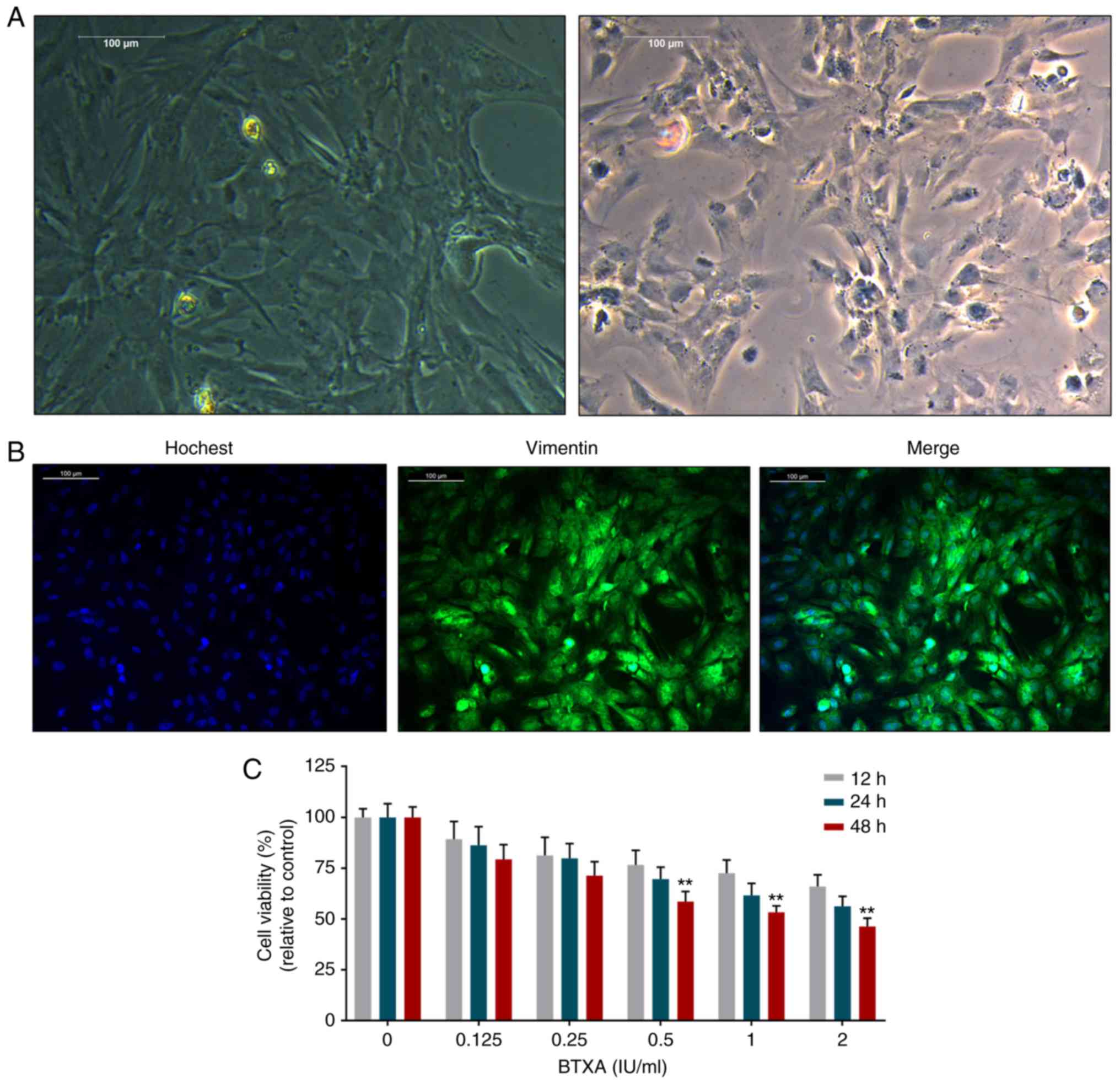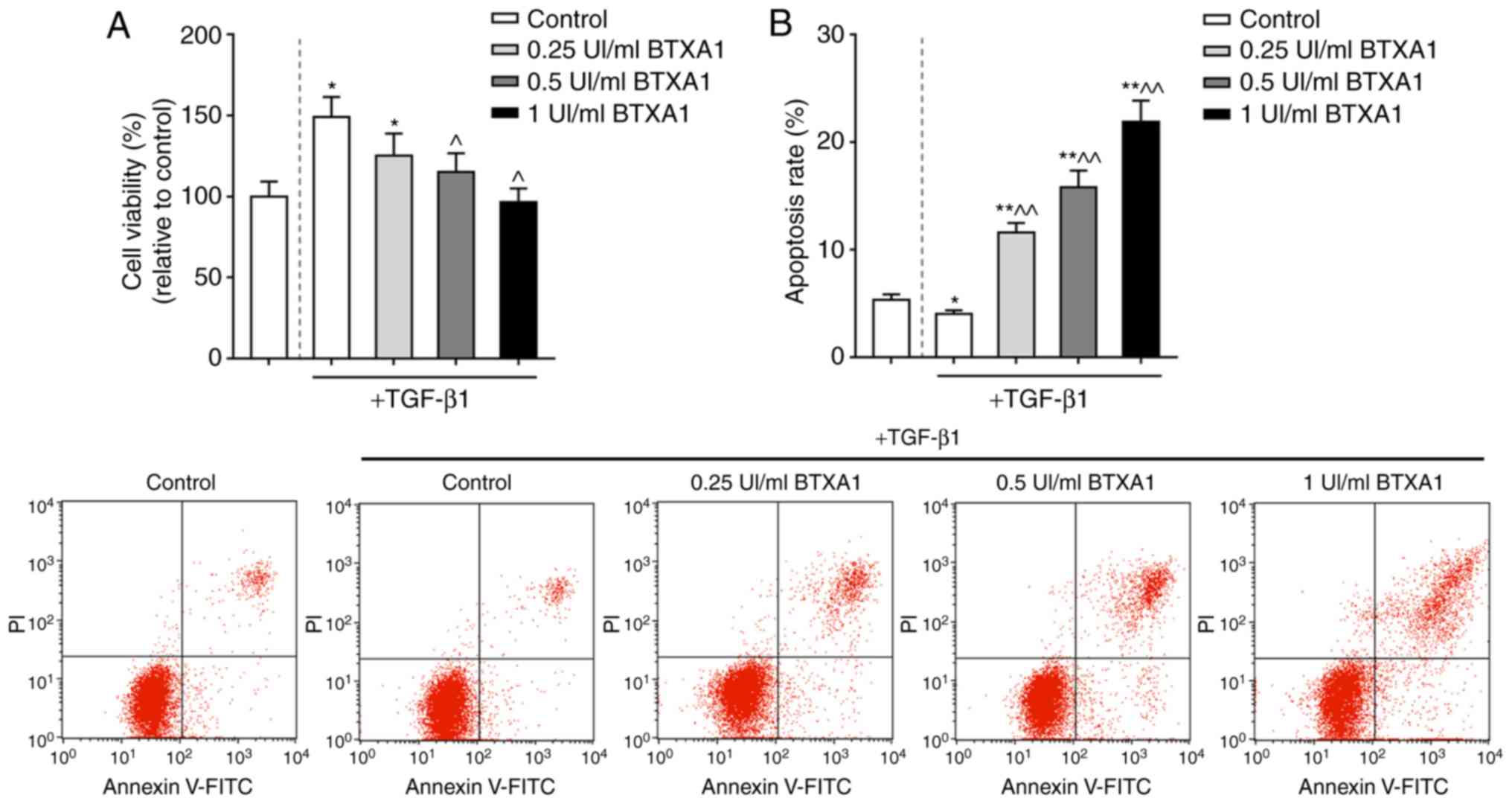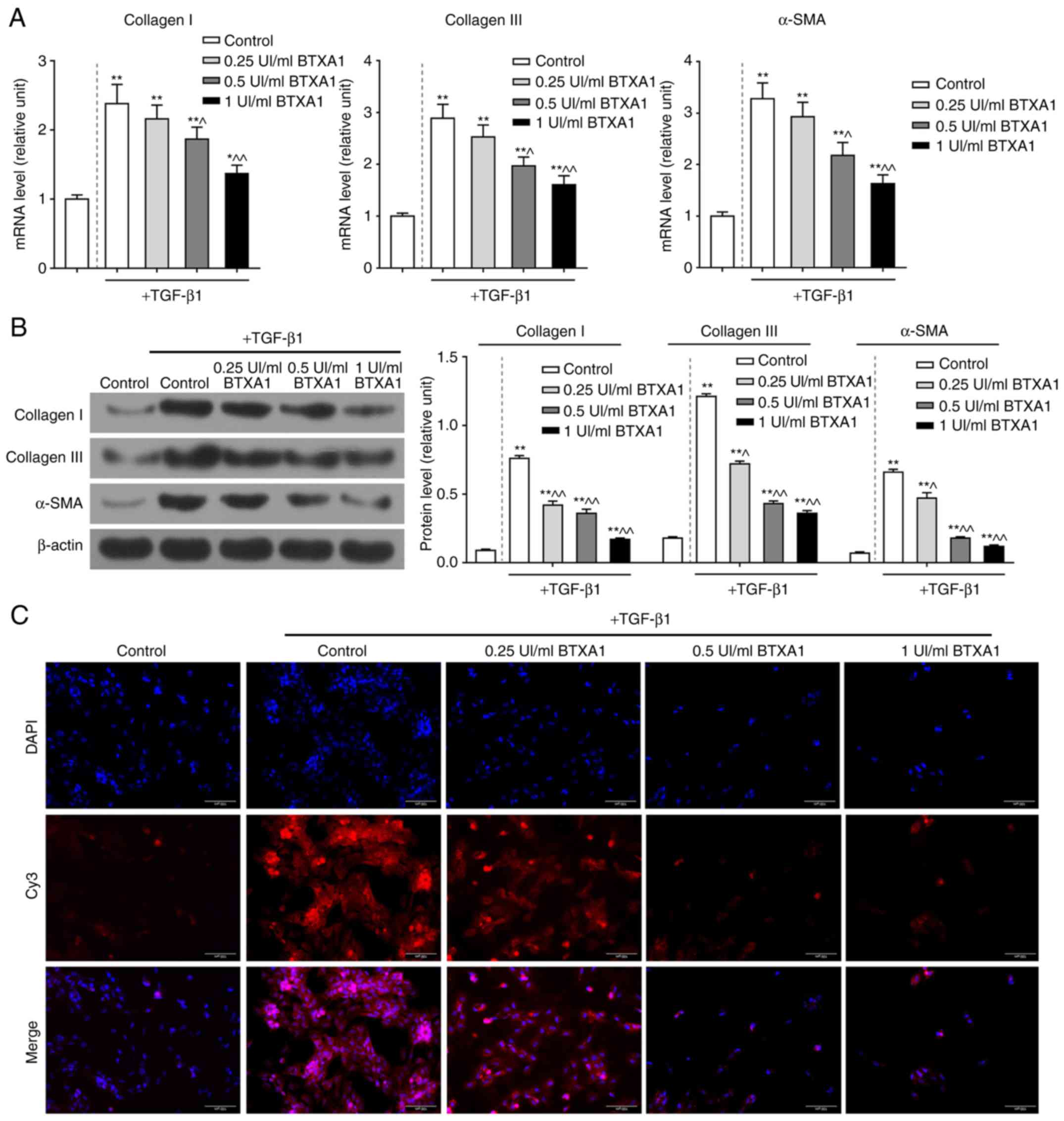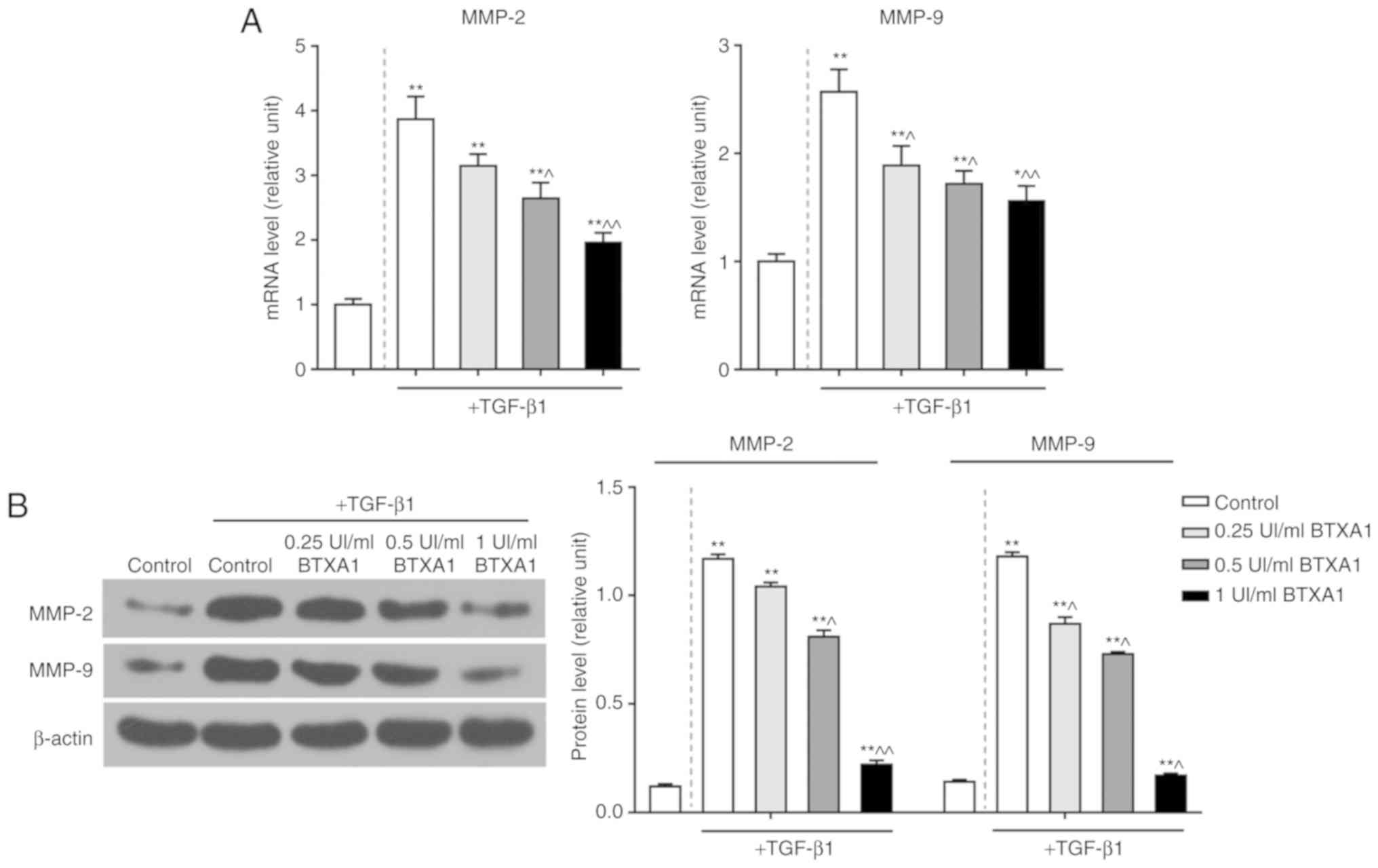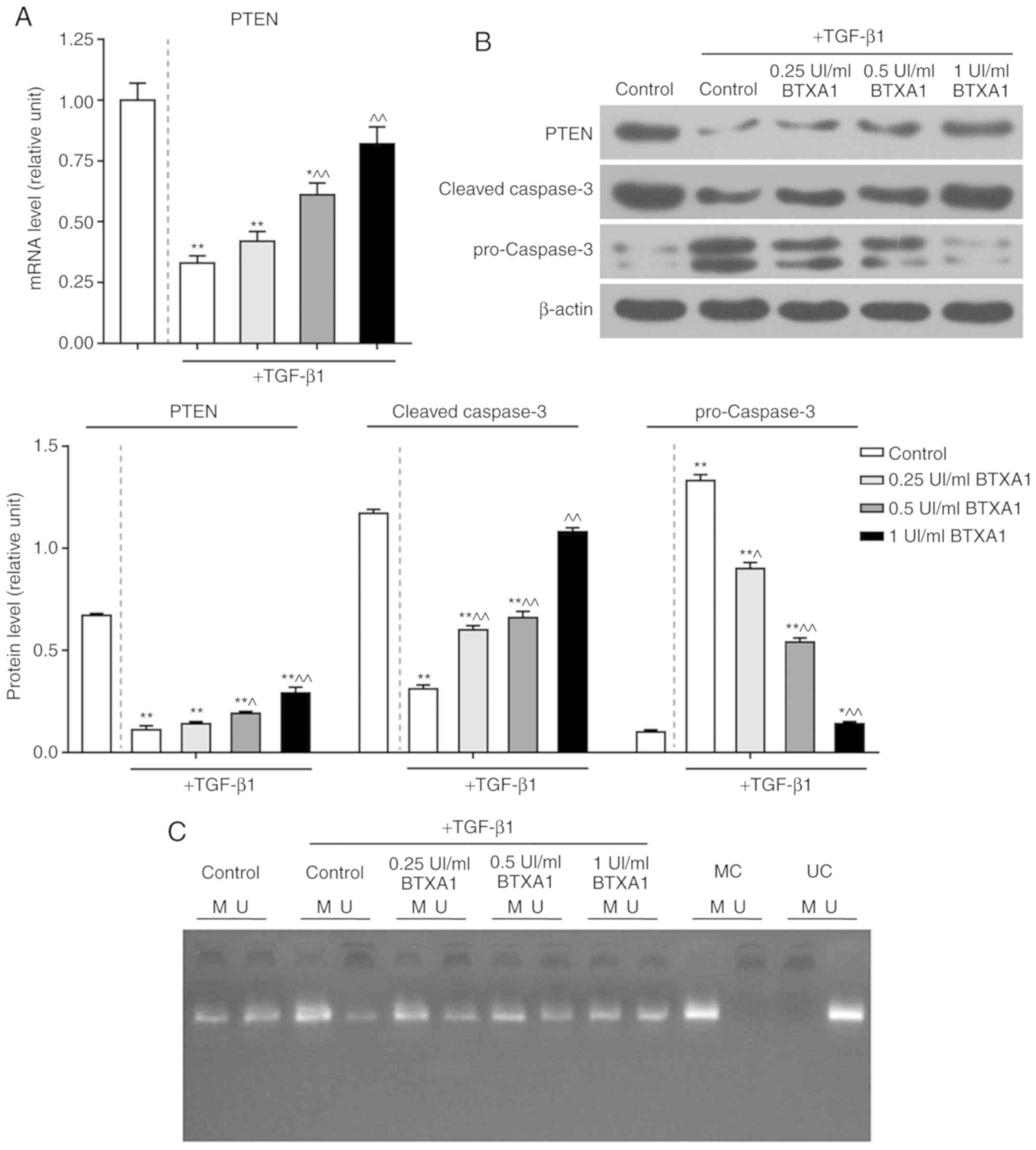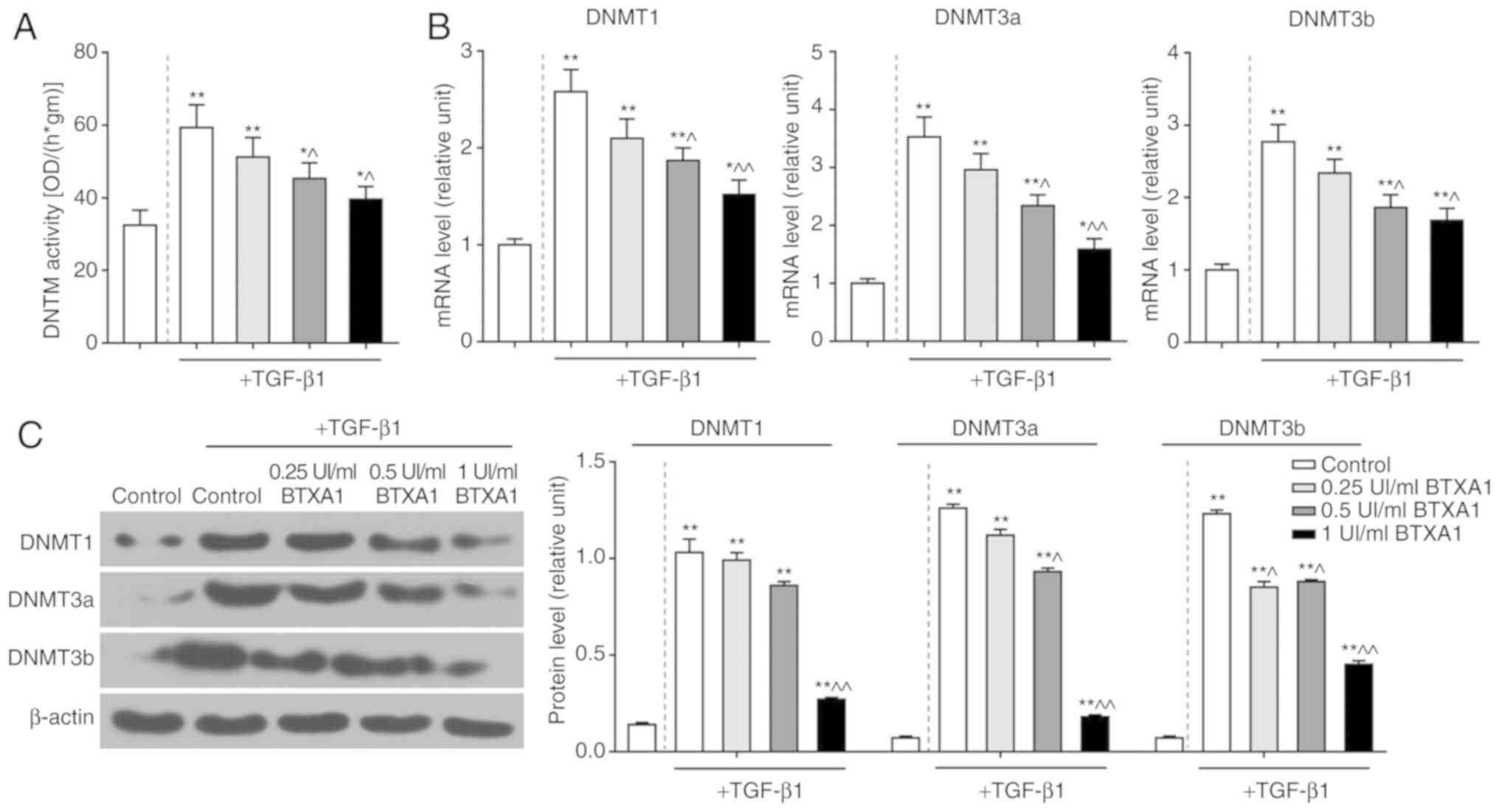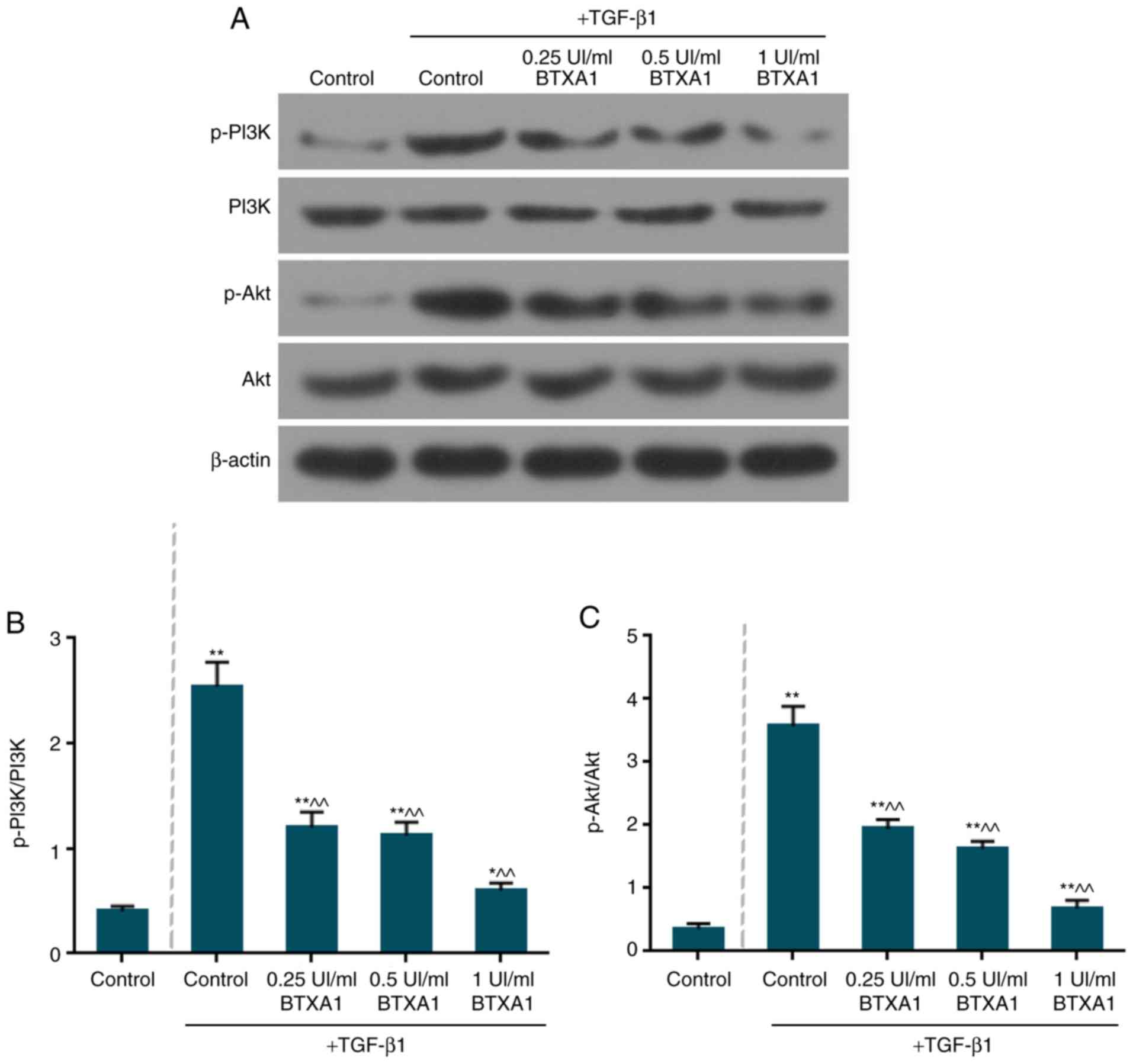|
1
|
Xiao Z, Zhang F, Lin W, Zhang M and Liu Y:
Effect of botulinum toxin type A on transforming growth factor
beta1 in fibroblasts derived from hypertrophic scar: A preliminary
report. Aesthetic Plast Surg. 34:424–427. 2010. View Article : Google Scholar
|
|
2
|
Butzelaar L, Ulrich MM, Mink van der Molen
AB, Niessen FB and Beelen RH: Currently known risk factors for
hypertrophic skin scarring: A review. J Plast Reconstr Aesthet
Surg. 69:163–169. 2016. View Article : Google Scholar : PubMed/NCBI
|
|
3
|
Xue M and Jackson CJ: Extracellular matrix
reorganization during wound healing and its impact on abnormal
scarring. Adv Wound Care (New Rochelle). 4:119–136. 2015.
View Article : Google Scholar
|
|
4
|
Liu J, Wang Y, Pan Q, Su Y, Zhang Z, Han
J, Zhu X, Tang C and Hu D: Wnt/β-catenin pathway forms a negative
feedback loop during TGF- β1 induced human normal skin
fibroblast-to-myofibroblast transition. J Dermatol Sci. 65:38–49.
2012. View Article : Google Scholar
|
|
5
|
Chun Q, ZhiYong W, Fei S and XiQiao W:
Dynamic biological changes in fibroblasts during hypertrophic scar
formation and regression. Int Wound J. 13:257–262. 2016. View Article : Google Scholar
|
|
6
|
Sarrazy V, Billet F, Micallef L, Coulomb B
and Desmoulière A: Mechanisms of pathological scarring: Role of
myofibroblasts and current developments. Wound Repair Regen.
19(Suppl 1): s10–s15. 2011. View Article : Google Scholar : PubMed/NCBI
|
|
7
|
Curran TA and Ghahary A: Evidence of a
role for fibrocyte and keratinocyte-like cells in the formation of
hypertrophic scars. J Burn Care Res. 34:227–231. 2013. View Article : Google Scholar
|
|
8
|
Ding J, Ma Z, Shankowsky HA, Medina A and
Tredget EE: Deep dermal fibroblast profibrotic characteristics are
enhanced by bone marrow-derived mesenchymal stem cells. Wound
Repair Regen. 21:448–455. 2013. View Article : Google Scholar : PubMed/NCBI
|
|
9
|
Gökçinar-Yagci B, Uçkan-Çetinkaya D and
Çelebi-Saltik B: Pericytes: Properties, functions and applications
in tissue engineering. Stem Cell Rev. 11:549–559. 2015. View Article : Google Scholar : PubMed/NCBI
|
|
10
|
Yan C, Grimm WA, Garner WL, Qin L, Travis
T, Tan N and Han YP: Epithelial to mesenchymal transition in human
skin wound healing is induced by tumor necrosis factor-alpha
through bone morphogenic protein-2. Am J Pathol. 176:2247–2258.
2010. View Article : Google Scholar : PubMed/NCBI
|
|
11
|
Wang X, Chu J, Wen CJ, Fu SB, Qian YL, Wo
Y, Wang C and Wang DR: Functional characterization of TRAP1-like
protein involved in modulating fibrotic processes mediated by
TGF-β/Smad signaling in hypertrophic scar fibroblasts. Exp Cell
Res. 332:202–211. 2015. View Article : Google Scholar : PubMed/NCBI
|
|
12
|
Lu L, Saulis AS, Liu WR, Roy NK, Chao JD,
Ledbetter S and Mustoe TA: The temporal effects of anti-TGF-beta1,
2, and 3 monoclonal antibody on wound healing and hypertrophic scar
formation. J Am Coll Surg. 201:391–397. 2005. View Article : Google Scholar : PubMed/NCBI
|
|
13
|
Pakyari M, Farrokhi A, Maharlooei MK and
Ghahary A: Critical role of transforming growth factor beta in
different phases of wound healing. Adv Wound Care (New Rochelle).
2:215–224. 2013. View Article : Google Scholar
|
|
14
|
Yin L, Zhao X, Ji S, He C, Wang G, Tang C,
Gu S and Yin C: The use of gene activated matrix to mediate
effective SMAD2 gene silencing against hypertrophic scar.
Biomaterials. 35:2488–2498. 2014. View Article : Google Scholar : PubMed/NCBI
|
|
15
|
Zhang YF, Zhou SZ, Cheng XY, Yi B, Shan
SZ, Wang J and Li QF: Baicalein attenuates hypertrophic scar
formation via inhibition of the transforming growth
factor-β/Smad2/3 signalling pathway. Br J Dermatol. 174:120–130.
2016. View Article : Google Scholar
|
|
16
|
Bai X, He T, Liu J, Wang Y, Fan L, Tao K,
Shi J, Tang C, Su L and Hu D: Loureirin B inhibits fibroblast
proliferation and extracellular matrix deposition in hypertrophic
scar via TGF-β/Smad pathway. Exp Dermatol. 24:355–360. 2015.
View Article : Google Scholar : PubMed/NCBI
|
|
17
|
Zunwen L, Shizhen Z, Dewu L, Yungui M and
Pu N: Effect of tetrandrine on the TGF-β-induced smad signal
transduction pathway in human hypertrophic scar fibroblasts in
vitro. Burns. 38:404–413. 2012. View Article : Google Scholar
|
|
18
|
Omranifard M, Heidari M, Farajzadegan Z,
Niktabar MR and Motamedi N: Botulinum toxin and burn induces
contracture. Arch Plast Surg. 43:609–611. 2016. View Article : Google Scholar : PubMed/NCBI
|
|
19
|
Jeong HS, Lee BH, Sung HM, Park SY, Ahn
DK, Jung MS and Suh IS: Effect of botulinum toxin type A on
differentiation of fibroblasts derived from scar tissue. Plast
Reconstr Surg. 136:171e–178e. 2015. View Article : Google Scholar : PubMed/NCBI
|
|
20
|
Gauglitz GG, Bureik D, Dombrowski Y,
Pavicic T, Ruzicka T and Schauber J: Botulinum toxin A for the
treatment of keloids. Skin Pharmacol Physiol. 25:313–318. 2012.
View Article : Google Scholar : PubMed/NCBI
|
|
21
|
Rasaii S, Sohrabian N, Gianfaldoni S,
Hadibarhaghtalab M, Pazyar N, Bakhshaeekia A, Lotti T,
Ramirez-Pacheco LA, Lange CS, Matta J, et al: Intralesional
triamcinolone alone or in combination with botulinium toxin A is
ineffective for the treatment of formed keloid scar: A double blind
controlled pilot study. Dermatol Ther. 32:e127812019. View Article : Google Scholar
|
|
22
|
Xiao Z, Zhang F and Cui Z: Treatment of
hypertrophic scars with intralesional botulinum toxin type A
injections: A preliminary report. Aesthetic Plast Surg. 33:409–412.
2009. View Article : Google Scholar : PubMed/NCBI
|
|
23
|
Xiao Z and Qu G: Effects of botulinum
toxin type a on collagen deposition in hypertrophic scars.
Molecules. 17:2169–2177. 2012. View Article : Google Scholar : PubMed/NCBI
|
|
24
|
Lee SD, Yi MH, Kim DW, Lee Y, Choi Y and
Oh SH: The effect of botulinum neurotoxin type A on capsule
formation around silicone implants: The in vivo and in vitro study.
Int Wound J. 13:65–71. 2016. View Article : Google Scholar
|
|
25
|
Chen M, Yan T, Ma K, Lai L, Liu C, Liang L
and Fu X: Botulinum toxin type A inhibits α-smooth muscle actin and
myosin II expression in fibroblasts derived from scar contracture.
Ann Plast Surg. 77:e46–e49. 2016. View Article : Google Scholar
|
|
26
|
Xiao Z, Zhang M, Liu Y and Ren L:
Botulinum toxin type a inhibits connective tissue growth factor
expression in fibroblasts derived from hypertrophic scar. Aesthetic
Plast Surg. 35:802–807. 2011. View Article : Google Scholar : PubMed/NCBI
|
|
27
|
Kim S, Ahn M, Piao Y, Ha Y, Choi DK, Yi
MH, Shin N, Kim DW and Oh SH: Effect of botulinum toxin type A on
TGF-beta/Smad pathway signaling: Implications for silicone-induced
capsule formation. Plast Reconstr Surg. 138:821e–829e. 2016.
View Article : Google Scholar
|
|
28
|
Li Y, Zhang J, Zhou Q, Wang H, Xie S, Yang
X, Ji P, Zhang W, He T, Liu Y, et al: Linagliptin inhibits high
glucose-induced transdifferentiation of hypertrophic scar-derived
fibroblasts to myofibroblasts via IGF/Akt/mTOR signalling pathway.
Exp Dermatol. 28:19–27. 2019. View Article : Google Scholar
|
|
29
|
Liu B, Guo Z and Gao W: miR-181b-5p
promotes proliferation and inhibits apoptosis of hypertrophic scar
fibroblasts through regulating the MEK/ERK/p21 pathway. Exp Ther
Med. 17:1537–1544. 2019.PubMed/NCBI
|
|
30
|
Zhang Q, Guo B, Hui Q, Chang P and Tao K:
miR-137 inhibits proliferation and metastasis of hypertrophic scar
fibroblasts via targeting pleiotrophin. Cell Physiol Biochem.
49:985–995. 2018. View Article : Google Scholar
|
|
31
|
Lim CP, Phan TT, Lim IJ and Cao X: Stat3
contributes to keloid pathogenesis via promoting collagen
production, cell proliferation and migration. Oncogene.
25:5416–5425. 2006. View Article : Google Scholar : PubMed/NCBI
|
|
32
|
Liao WT, Yu HS, Arbiser JL, Hong CH,
Govindarajan B, Chai CY, Shan WJ, Lin YF, Chen GS and Lee CH:
Enhanced MCP-1 release by keloid CD14+ cells augments fibroblast
proliferation: Role of MCP-1 and Akt pathway in keloids. Exp
Dermatol. 19:e142–e150. 2010. View Article : Google Scholar : PubMed/NCBI
|
|
33
|
Kulkarni AA, Thatcher TH, Olsen KC,
Maggirwar SB, Phipps RP and Sime PJ: PPAR-γ ligands repress
TGFβ-induced myofibroblast differentiation by targeting the
PI3K/Akt pathway: Implications for therapy of fibrosis. PLoS One.
6:e159092011. View Article : Google Scholar
|
|
34
|
Paterno J, Vial IN, Wong VW, Rustad KC,
Sorkin M, Shi Y, Bhatt KA, Thangarajah H, Glotzbach JP and Gurtner
GC: Akt-mediated mechanotransduction in murine fibroblasts during
hypertrophic scar formation. Wound Repair Regen. 19:49–58. 2011.
View Article : Google Scholar
|
|
35
|
Dey JH, Bianchi F, Voshol J, Bonenfant D,
Oakeley EJ and Hynes NE: Targeting fibroblast growth factor
receptors blocks PI3K/AKT signaling, induces apoptosis, and impairs
mammary tumor outgrowth and metastasis. Cancer Res. 70:4151–4162.
2010. View Article : Google Scholar : PubMed/NCBI
|
|
36
|
Deng B, Yang X, Liu J, He F, Zhu Z and
Zhang C: Focal adhesion kinase mediates TGF-beta1-induced renal
tubular epithelial-to-mesenchymal transition in vitro. Mol Cell
Biochem. 340:21–29. 2010. View Article : Google Scholar : PubMed/NCBI
|
|
37
|
Guo L, Chen L, Bi S, Chai L, Wang Z, Cao
C, Tao L and Li S: PTEN inhibits proliferation and functions of
hypertrophic scar fibroblasts. Mol Cell Biochem. 361:161–168. 2012.
View Article : Google Scholar
|
|
38
|
Takashima M, Parsons CJ, Ikejima K,
Watanabe S, White ES and Rippe RA: The tumor suppressor protein
PTEN inhibits rat hepatic stellate cell activation. J
Gastroenterol. 44:847–855. 2009. View Article : Google Scholar : PubMed/NCBI
|
|
39
|
White ES, Thannickal VJ, Carskadon SL,
Dickie EG, Livant DL, Markwart S, Toews GB and Arenberg DA:
Integrin alpha4beta1 regulates migration across basement membranes
by lung fibroblasts: A role for phosphatase and tensin homologue
deleted on chromosome 10. Am J Respir Crit Care Med. 168:436–442.
2003. View Article : Google Scholar : PubMed/NCBI
|
|
40
|
Larsson O, Diebold D, Fan D, Peterson M,
Nho RS, Bitterman PB and Henke CA: Fibrotic myofibroblasts manifest
genome-wide derangements of translational control. PLoS One.
3:e32202008. View Article : Google Scholar : PubMed/NCBI
|
|
41
|
Mori T, Okumura M, Matsuura M, Ueno K,
Tokura S, Okamoto Y, Minami S and Fujinaga T: Effects of chitin and
its derivatives on the proliferation and cytokine production of
fibroblasts in vitro. Biomaterials. 18:947–951. 1997. View Article : Google Scholar : PubMed/NCBI
|
|
42
|
Livak KJ and Schmittgen TD: Analysis of
relative gene expression data using real-time quantitative PCR and
the 2(-Delta Delta C(T)) method. Methods. 25:402–408. 2001.
View Article : Google Scholar
|
|
43
|
Jiang B, Zu W, Xu J, Xiong Z, Zhang Y, Gao
S, Ge S and Zhang L: Botulinum toxin type A relieves
sternocleidomastoid muscle fibrosis in congenital muscular
torticollis. Int J Biol Macromol. 112:1014–1020. 2018. View Article : Google Scholar : PubMed/NCBI
|
|
44
|
Zhao JC, Zhang BR, Hong L, Shi K, Wu WW
and Yu JA: Extracorporeal shock wave therapy with low-energy flux
density inhibits hypertrophic scar formation in an animal model.
Int J Mol Med. 41:1931–1938. 2018.PubMed/NCBI
|
|
45
|
Qiu SS, Dotor J and Hontanilla B: Effect
of P144® (Anti-TGF-β) in an 'In Vivo' human hypertrophic scar model
in nude mice. PLoS One. 10:e01444892015. View Article : Google Scholar
|
|
46
|
Wang X, Gao Z, Wu X, Zhang W, Zhou G and
Liu W: Inhibitory effect of TGF-β peptide antagonist on the
fibrotic phenotype of human hypertrophic scar fibroblasts. Pharm
Biol. 54:1189–1197. 2016.
|
|
47
|
Oliveira GV, Hawkins HK, Chinkes D, Burke
A, Tavares AL, Ramos-e-Silva M, Albrecht TB, Kitten GT and Herndon
DN: Hypertrophic versus non hypertrophic scars compared by
immu-nohistochemistry and laser confocal microscopy: Type I and III
collagens. Int Wound J. 6:445–452. 2009. View Article : Google Scholar
|
|
48
|
Wang YW, Liou NH, Cherng JH, Chang SJ, Ma
KH, Fu E, Liu JC and Dai NT: siRNA-targeting transforming growth
factor-β type I receptor reduces wound scarring and extracellular
matrix deposition of scar tissue. J Invest Dermatol. 134:2016–2025.
2014. View Article : Google Scholar : PubMed/NCBI
|
|
49
|
Ulrich D, Ulrich F, Unglaub F, Piatkowski
A and Pallua N: Matrix metalloproteinases and tissue inhibitors of
metalloproteinases in patients with different types of scars and
keloids. J Plast Reconstr Aesthet Surg. 63:1015–1021. 2010.
View Article : Google Scholar
|
|
50
|
Huang D, Liu Y, Huang Y, Xie Y, Shen K,
Zhang D and Mou Y: Mechanical compression upregulates MMP9 through
SMAD3 but not SMAD2 modulation in hypertrophic scar fibroblasts.
Connect Tissue Res. 55:391–396. 2014. View Article : Google Scholar : PubMed/NCBI
|
|
51
|
Luan Y, Chen M and Zhou L: MiR-17 targets
PTEN and facilitates glial scar formation after spinal cord
injuries via the PI3K/Akt/mTOR pathway. Brain Res Bull. 128:68–75.
2017. View Article : Google Scholar
|
|
52
|
Pi WF, Guo XJ, Su LP and Xu WG:
Troglitazone upregulates PTEN expression and induces the apoptosis
of pulmonary artery smooth muscle cells under hypoxic conditions.
Int J Mol Med. 32:1101–1109. 2013. View Article : Google Scholar : PubMed/NCBI
|
|
53
|
Yan YT, Li SD, Li C, Xiong YX, Lu XH, Zhou
XF, Yang LQ, Pu LJ and Luo HY: Panax notoginsenoside saponins Rb1
regulates the expressions of Akt mTOR/PTEN signals in the
hippocampus after focal cerebral ischemia in rats. Behav Brain Res.
345:83–92. 2018. View Article : Google Scholar : PubMed/NCBI
|
|
54
|
Sanders YY, Pardo A, Selman M, Nuovo GJ,
Tollefsbol TO, Siegal GP and Hagood JS: Thy-1 promoter
hypermethylation: A novel epigenetic pathogenic mechanism in
pulmonary fibrosis. Am J Respir Cell Mol Biol. 39:610–618. 2008.
View Article : Google Scholar : PubMed/NCBI
|
|
55
|
Bian EB, Huang C, Ma TT, Tao H, Zhang H,
Cheng C, Lv XW and Li J: DNMT1-mediated PTEN hypermethylation
confers hepatic stellate cell activation and liver fibrogenesis in
rats. Toxicol Appl Pharmacol. 264:13–22. 2012. View Article : Google Scholar : PubMed/NCBI
|
|
56
|
Wang X, Wang Z, Wang Q, Wang H, Liang H
and Liu D: Epigenetic modification differences between fetal
fibroblast cells and mesenchymal stem cells of the Arbas Cashmere
goat. Res Vet Sci. 114:363–369. 2017. View Article : Google Scholar : PubMed/NCBI
|
|
57
|
Zhu G, Chai J, Ma L, Duan H and Zhang H:
Downregulated microRNA-32 expression induced by high glucose
inhibits cell cycle progression via PTEN upregulation and Akt
inactivation in bone marrow-derived mesenchymal stem cells. Biochem
Biophys Res Commun. 433:526–531. 2013. View Article : Google Scholar : PubMed/NCBI
|
|
58
|
Kitagishi Y and Matsuda S: Diets involved
in PPAR and PI3K/AKT/PTEN pathway may contribute to neuroprotection
in a traumatic brain injury. Alzheimers Res Ther. 5:422013.
View Article : Google Scholar : PubMed/NCBI
|
|
59
|
Zhang Y, Yao X, Jiang C, Yue J, Guan J,
Cheng H, Hajirashid M, Wang Y and Fan L: Expression of PI3K, PTEN
and Akt in small intestinal adenocarcinoma detected by quantum
dots-based immunofluorescence technology. Cancer Biomark.
13:299–305. 2013. View Article : Google Scholar : PubMed/NCBI
|
|
60
|
Pericacho M, Velasco S, Prieto M, Llano E,
López-Novoa JM and Rodríguez-Barbero A: Endoglin haploinsufficiency
promotes fibroblast accumulation during wound healing through Akt
activation. PLoS One. 8:e546872013. View Article : Google Scholar : PubMed/NCBI
|
|
61
|
Seront E, Pinto A, Bouzin C, Bertrand L,
Machiels JP and Feron O: PTEN deficiency is associated with reduced
sensitivity to mTOR inhibitor in human bladder cancer through the
unhampered feedback loop driving PI3K/Akt activation. Br J Cancer.
109:1586–1592. 2013. View Article : Google Scholar : PubMed/NCBI
|















